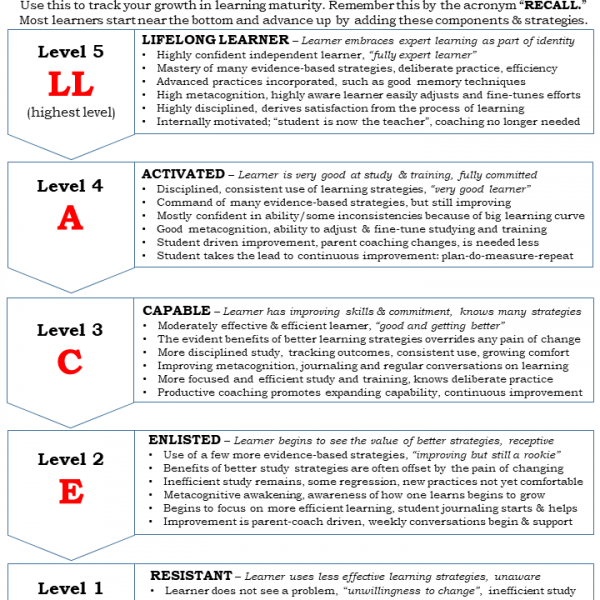
Metacognition Checklist

Reading time: 3 minutes
Use this checklist to evaluate your metacognition. Train yourself to ask questions like these to keep your metacognition high. There are potentially many questions you should be asking yourself about your learning – these provide some good examples.
Keep this checklist handy. For the first few weeks, practice asking yourself some of these questions before, during, and at the end of each session. Develop this as a positive habit every time you study. Incorporate this into your warmup routine before you begin a practice session, and into your mental shut down at the end.
Another useful technique is to incorporate a halfway pause in all study sessions, viewing online classes, and reading chapters where at the midpoint you ask yourself some of the monitoring questions.
Planning:
Before you study or practice, how often do you consider these questions:
![]() What are my goals for today’s (or this week’s) session going to be?
What are my goals for today’s (or this week’s) session going to be?
![]() What strategies will I use to learn this subject?
What strategies will I use to learn this subject?
![]() What do I already know about this topic?
What do I already know about this topic?
![]() What questions do I already have about this topic?
What questions do I already have about this topic?
![]() What are all the things I need in place to accomplish this task?
What are all the things I need in place to accomplish this task?
![]() What will I need to do to successfully complete this task? What are the steps?
What will I need to do to successfully complete this task? What are the steps?
![]() If I have done something like this before, how can I do a better job this time?
If I have done something like this before, how can I do a better job this time?
![]() Which aspects of learning this should I spend more or less time on?
Which aspects of learning this should I spend more or less time on?
![]() At the end of this session, what do I hope to accomplish? What are the outcomes?
At the end of this session, what do I hope to accomplish? What are the outcomes?
Monitoring
While you are studying or practicing, how often do you ask yourself these questions:
![]() What insights am I having as I experience this session?
What insights am I having as I experience this session?
![]() What questions are arising from this?
What questions are arising from this?
![]() Do I find this interesting? Why or why not? How can I make this material personally relevant?
Do I find this interesting? Why or why not? How can I make this material personally relevant?
![]() What strategies am I using that are working well and those not so well?
What strategies am I using that are working well and those not so well?
![]() What is most challenging for me?
What is most challenging for me?
![]() Which of my confusions have I clarified? Which remain and how can I clarify them?
Which of my confusions have I clarified? Which remain and how can I clarify them?
![]() How confident am I in my learning?
How confident am I in my learning?
Evaluating
At the end of a session, how often do you ask these questions to reflect on your learning:
![]() What was this session about? What did I learn?
What was this session about? What did I learn?
![]() What did I hear or read today that contradicted my prior understanding?
What did I hear or read today that contradicted my prior understanding?
![]() What existing knowledge can I connect this new information to?
What existing knowledge can I connect this new information to?
![]() What do I need to do next to clarify my confusions?
What do I need to do next to clarify my confusions?
![]() How well did I accomplish my goals for this study session or task?
How well did I accomplish my goals for this study session or task?
![]() What would I do differently next time I study this?
What would I do differently next time I study this?
![]() What worked well for me that I will want to use next time?
What worked well for me that I will want to use next time?
Thanks to Kimberly D. Tanner for many of these questions from Promoting Student Metacognition.
Conclusion
Metacognition should become an integral part of your learning process, not something you occasionally do, or do because you are stuck. Use it often to track your learning, make adjustments to your learning strategies, and to heighten awareness of your learning process.
There is a need to teach for metacognitive knowledge explicitly…we are continually surprised at the number of students who come to college having very little metacognitive knowledge; knowledge about different strategies, different cognitive tasks, and particularly, accurate knowledge about themselves.






